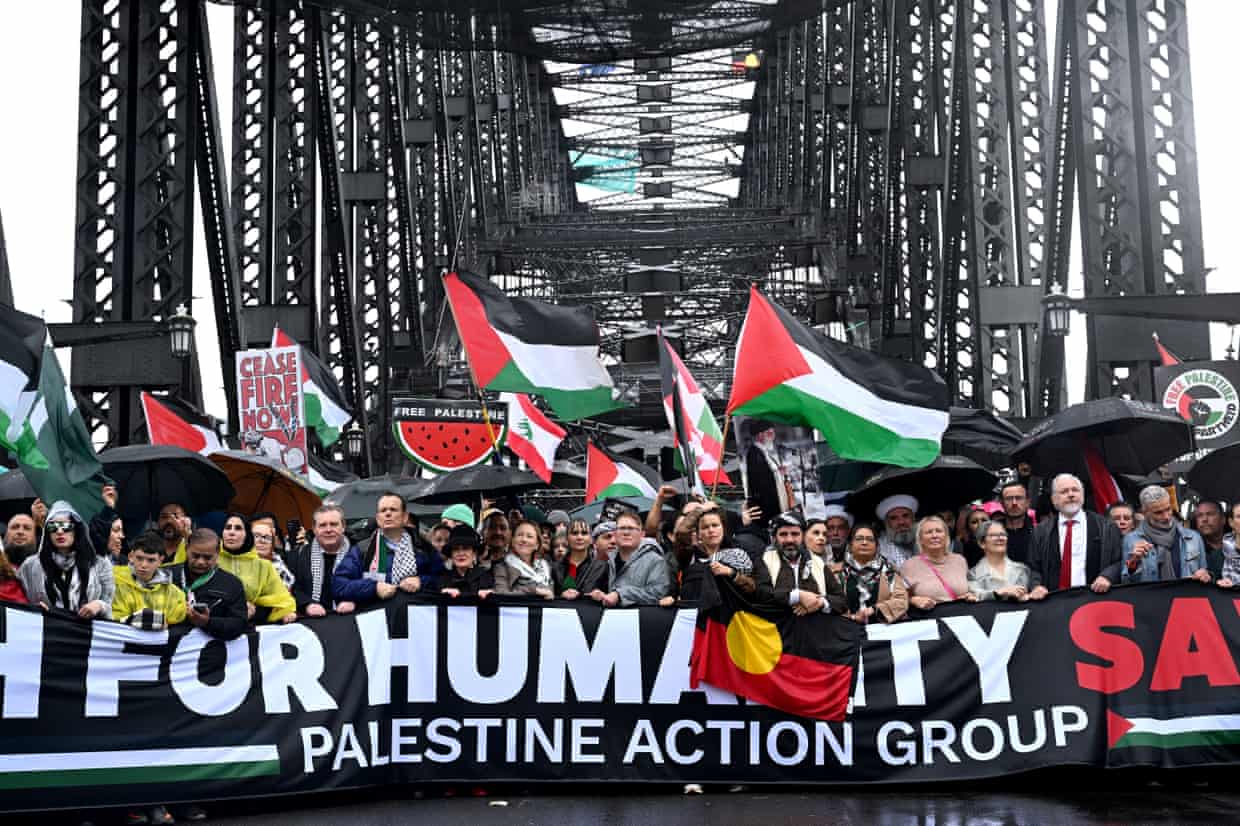New South Wales Premier Chris Minns is encountering significant pushback from his Labor caucus regarding his recent stance on the pro-Palestine march across the Sydney Harbour Bridge. On Tuesday, caucus members are expected to introduce a motion condemning the conditions in Gaza while endorsing the right to protest. This comes after the march took place on Sunday, following a decision by the NSW Supreme Court that overturned police restrictions on the event, citing public safety concerns.
Crowd estimates for the march varied widely, with NSW police suggesting around 90,000 participants, while organizers from the Palestine Action Group claimed the turnout was closer to 300,000. Prominent state MPs, including Penny Sharpe, the energy minister, and frontbencher Jihad Dib, joined the demonstration. Other state MPs, such as Stephen Lawrence, Lynda Voltz, and Sarah Kaine, were also present, alongside former NSW Premier Bob Carr.
Minns’ position on the protests has drawn sharp criticism from various factions within the Labor Party. Members from both the right faction and the soft left express concern that he is prioritizing the views of media outlets, such as those under News Corp, over the sentiments of his party. “There’s a sense that our policy positions are at the most conservative end of the spectrum,” one right faction member commented, requesting anonymity. “I would just like a bit more Labor in my life.”
Historically, the hard left faction, which supported Minns’ ascent to leadership, has remained relatively silent on his approach to protests and law enforcement issues, including recent changes to bail laws. This silence is contributing to growing tensions among party members. One member from the right faction criticized the left for their absence on progressive issues, stating, “The base is really unhappy.”
Mark Morey, Secretary of Unions NSW, emphasized the importance of facilitating peaceful protests, especially in light of public concern regarding violence and humanitarian crises. He stated, “The government’s role should be to facilitate peaceful expression, not obstruct it.” Morey further argued that the large turnout indicates widespread concern for Gaza and that political leaders should be responsive rather than repressive.
Despite the backlash, Minns reiterated on Monday that he does not regret his opposition to the march, emphasizing his responsibility to prioritize public safety. He acknowledged the “huge groundswell” of public opinion, stating, “We have to balance public safety and the public’s right to protest.” Nevertheless, he warned against viewing the bridge as a venue for unrestricted protests, asserting, “No one should believe that it’s open season on the bridge.”
In response to Minns’ comments, Lawrence criticized the idea of suppressing a mass protest. He noted that the protest was inevitable and suggested that the government should have facilitated it to ensure safety. Lawrence also revealed that the protest organizers had proposed delaying the event until August 24, but this offer was declined, forcing police to implement last-minute preparations.
Minns hinted at the possibility of appealing the Supreme Court’s ruling that allowed the protest to proceed. He also did not dismiss the idea of introducing legislation to impose restrictions on future protests on the bridge, although he stated that he would not rush any such legislation.
Concerns about Minns’ leadership and authority over the caucus are growing. Sue Higginson, a member of the Greens, remarked on the internal dissent regarding his handling of the situation. “Labor Premier Chris Minns is acting strangely and is not listening,” she stated. Higginson further questioned his absence from the march, asking, “What was more important for the premier than attending the march for humanity?”
As tensions within the Labor Party escalate, the focus remains on how Minns will navigate this internal conflict while addressing the significant public concern over the humanitarian situation in Gaza.
